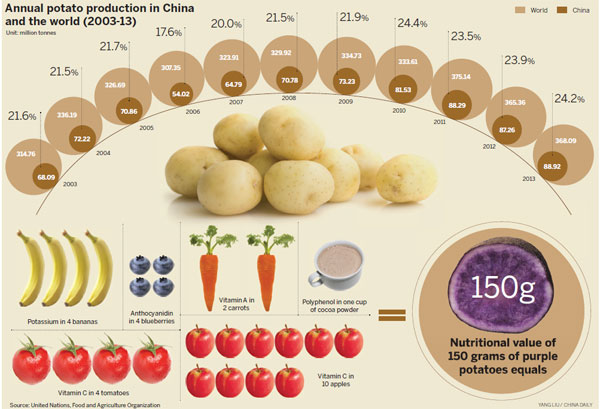News
Falling in love with local potatoes
Updated: 2015-08-13By Zhu Wenqian ( China Daily )
Consumption in developing countries will continue to grow after global production increases 20 percent during past 20 years
Tian Shen is a graduate student based in Beijing and loves tucking into a dish that includes potatoes.
But being a fitness fan, she tends to go easy on french fries and opts instead for something slightly more healthy.
"I usually have boiled or mashed potatoes because they are less oily than french fries," Tian, 23, who is studying finance, said. "I enjoy starchy food and I eat potatoes once or twice a week. That means I can cut down on rice. Occasionally, I will eat french fries as a treat."
China has a weird love affair with the humble potato. It is diced and sliced before being used in various dishes, where it is mixed with other vegetables, such as green and yellow peppers.
Considered the fourth food staple in China after rice, wheat and corn, potato production has increased on average by 6 percent annually in the past 10 years.
In 2014, the country harvested 94 million tons of potatoes from 5.6 million hectares of land, making China the leading producer in the world, ahead of Russia, India and the United States.
With around 5,000 varieties, global potato production in 2013 was estimated at 368 million tons. This was an increase of more than 20 percent during the past two decades.
"As the largest producer of potatoes, China accounts for more than 25 percent of the world's production," Bayer AG, a German chemical and pharmaceutical company that specializes in agricultural pro-ducts, reported.
"With a comparably low average productivity rate of about 17 tons per hectare, the country still has great potential when compared to Europe, with 30 tons per hectare, and the US, with more than 40 tons per hectare, to further enhance its yields."
Key growing areas are the Inner Mongolia autonomous region, Gansu province in the northwest of China and the southwest province of Yunnan. With cool, dry climates and constant sunlight, they are ideal for potato farming.
According to the Ministry of Commerce, Dingxi in Gansu province supplies fast food giants McDonald's and KFC with its potatoes, which are then turned into french fries, for their thousands of outlets here.
"China's potato yield has increased from approximately 12 tons per hectare 40 years ago to 16 tons per hectare now, and the planting area has grown by 20 percent," Barbara Wells, director of International Potato Center, said at the World Potato Congress in Beijing last month.
Still, the country consumes just 41.2 kilograms of potatoes per capita annually. That is well below the average consumption level of Western countries, which is more than 70 kilograms per capita annually.
But with its ultra-low fat content, potato is gaining popularity with consumers here. An average-size potato contains as much protein as an egg, and 10 times more vitamin C than an apple.
"Potatoes are good options when you look at the nutritional value," Bi Yang, a professor at the Gansu Agricultural University, told the Xinhua News Agency. "This is often overlooked."
The government plans to boost potato production as part of its policy to beef up food security by 2020. This will also help increase incomes for farmers.
Already there are more potato products on the market. Food brands have introduced bread, noodles, dumplings, pancakes and cakes all made from potato.
You can even find potato-flavored ice cream and sweet potato juice as companies try to attract a new generation of customers.
"The consumption of potatoes in developing countries will continue to grow significantly from a relatively low base, and there will be more opportunities," Percy Misika, the United Nations food and agriculture representative in China, said.
Repacking and promoting potato as a healthy product in a planned diet will be crucial if the market here is to continue to grow. Finding the right balance will be vital in changing consumer perceptions.
"China should gradually adjust its consumption structure," Ke Bingsheng, president of China Agricultural University, said. "We need to develop different potato varieties with distinctive flavors and introduce other processed products that are relevant to modern life."
Major companies will play a key role in doing this. Beijing Hengde Jiahui Equity Investment Co is looking to fund agricultural and food firms focusing on the industry, and has set up a center in Yanqing county in the northern suburb of Beijing.
"China's potato industry will improve significantly in the near future. I found many potato companies are looking to buy advanced technology and equipment, but some need extra funding," Zhou Xiangyang, general manager at Beijing Hengde Jiahui, said.
Bringing in cutting-edge pest control techniques, such as improved pesticides, and upgrading fertilizers will also increase yields.
Advances in technology have improved production in the US, Europe and even Latin America, but China is in danger of falling behind.
"The production and processing technology of potatoes in China is not what it should be compared to other parts of the world, such as Europe and some Latin American countries," Zhou said.
"Expanding planting areas and increasing the yields of potatoes per unit is the next big step. This is recognized by the government, which realizes the importance of potato production, as well as the role of new varieties of products in stores and shops," he added.
Bayer CropScience (China) Co Ltd, which is part of Bayer AG, has seen sales of its pesticides and fertilizers double here in the past three years, without disclosing detailed financial figures.
The company takes a high-tech approach to solving problems such as pest control and potato-related diseases, which will help increase consumer confidence in the product and fuel growth.
"When growing potatoes, the wrong pesticides can damage yields. Disease can also be a problem. So we produce solutions that can keep crops healthy and increase yields," Koen Van den Eynde, horticulture business manager at Bayer CropScience (China), said.
"We have started from a very small base, but there is room for growth here. Chinese consumers are spending more money on high-quality food and vegetables, and this will help drive our business growth," he added.
zhuwenqian@chinadaily.com.cn

|
A king size pancake made of potatoes is ready to be served on a plate, while models show off giant painted potatoes at the Beijing World Potato Congress last month. Zhang Wei / China Daily |



